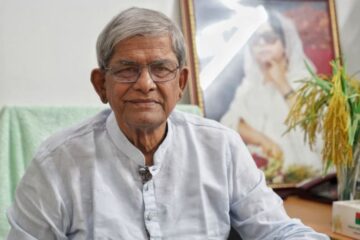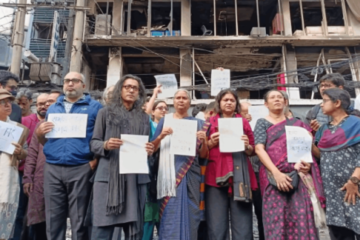Economists fear that Bangladesh Bank’s move to unify five weak Shariah-based banks into a state-owned bank may reduce operating costs and administrative complexity. Still, if the responsibility for weak banks is placed on strong banks, the sector may become more unstable.
With the approval of the interim government, “Sammilito Islami Bank PLC” is going to be formed by merging five Shariah banks—Exim, First Security Islami, Global Islami, Social Islami, and Union.
The Ministry of Finance and Bangladesh Bank are jointly completing this process.
The articles of association and memorandum of association of the new bank have been sent to the Law Ministry for vetting.
The new bank may start operations by December, according to relevant sources.
According to the plan, the authorized capital of the new bank is Tk40,000 crore, and the paid-up capital is Tk35,000 crore.
Of this, the government will provide Tk20,000 crore—half in cash, the rest through Sukuk bonds.
About Tk15,000 crore of institutional depositors’ dues will be included in the capital through conversion into shares (bail-in process).
Through this bail-in process, a part of the claims or dues of the bank’s customers and other creditors will be converted into shares. Later, that money will be paid in stages according to plan.
Limping existence
The five banks complain that no new deposits are coming in, and the previous liquidity support from Bangladesh Bank has also ended.
It is learned that no new support has been received from the Bangladesh Bank in the last three to four months. As a result, the situation of the banks is getting worse.
Although their branches are operating, business activities are being disrupted.
Customer complaints and bank-based research have revealed that customers have not been able to withdraw their deposits since the merger announcement.
Every day, arguments between customers and officials occur in most bank branches, often leading to fights.
Economists say that the main reason for this is that those banks were operating in an uncontrolled state for a long time.
Dr Zahid Hussain, former chief economist of the World Bank’s Dhaka office, said: “This is the result of the long-standing plight of the banks. Depositors will be paid only after the formation of the new bank. However, this suffering of the customers is sad.”
Mohammad Nurul Amin, chairman of the Global Islami Bank, said: “Loans are not being recovered, and new deposits are not coming in. In this situation, it has become difficult to return depositors’ money.”
Central bank officials said that after the merger, depositors will get their money back within a minimum of six months and a maximum of five years.
Bangladesh Bank has already prepared a detailed roadmap by determining the process and timeframe for returning the money.
The roadmap will be published in the government gazette soon, and the money return process will start from the effective date mentioned in the gazette.
At the same time, savings of up to Tk2 lakh have been identified as safe deposits.
Bankers have confirmed that the money of these savers will be paid immediately after the merger.
Unified bank
Officials at the Financial Institutions Division said that after the merger, all the assets and liabilities of the five private banks will come under the new bank, which will operate as a government-owned bank.
After the formation of the new bank, the highest priority will be given to returning the money of small depositors, and the dues of large depositors will be paid in stages.
Central bank officials said that since there are multiple branches of the same bank in many district towns, plans have been made to transfer some of them to the upazila level.
In addition, the process of integrating IT infrastructure, treasury activities, and internal control systems has also begun.
Global Islami Bank chairman Mohammad Nurul Amin said: “Although the merger process has not officially started, initial preparations are underway. The overall status of loans, deposits, manpower, and branch network is being analyzed.”
After the formal process of forming the new bank is completed, Bangladesh Bank will appoint administrators to those five banks when the Finance Division allocates capital.
With the appointment of administrators, the boards of directors of the banks concerned will be dissolved, and the current managing directors will resign.
The administrators will then complete all the activities to merge the five banks under the new bank and hand over the responsibility.
Bangladesh Bank executive director and spokesperson Arif Hossain Khan said: “The decision to appoint administrators in the five banks has not yet been implemented. The administrators will take over the responsibility once the legal process and release of funds from the government are finalized.”
Pressure on 18,000 employees, 761 branches
More than 18,000 officers and employees are currently working in the five banks, whose salaries and allowances cost about Tk2,000 crore annually.
According to experts, if the merged bank cannot handle this huge manpower and cost structure, it will be difficult to be sustainable.
Similarly, work is also underway to reorganize 761 branches. Since many districts have multiple bank branches, there are plans to move some of them to upazilas or marginal areas.
At the end of 2024, the defaulted loans of Exim Bank stood at Tk14,903 crore, First Security Islami Bank at Tk55,920 crore, Social Islami Bank at Tk23,633 crore, and Global Islami Bank at Tk13,880 crore.
Union Bank has not yet published its audited report, but its defaulted loans were significant as of September.
According to economists, if the liabilities of these banks are transferred to the new bank, it will become a challenge to maintain its financial balance.
After the merger, the bank will be operated under state ownership.
It is still undecided whether the employees will get the status of a government bank or lose that status if it is privatized later.
According to the government’s plan, the bank will be privatized within five years.
Bangladesh Development Bank (BDBL) was formed by merging Shilpa Bank (BSB) and Shilpa Rin Sangstha (BSRS) in 2009. But even after the merger, the bank is still in a financial crisis.
Dhaka University’s Prof Md Maksudur Rahman Sarkar said: “We do not want another BDBL. If the culture of impunity is not changed, there will be no benefit from the merger alone.”
Ahsan Ullah, adviser to the governor of Bangladesh Bank, said: “Merger is not a punishment; it is a restructuring process. If good governance and accountability can be ensured, this bank can set new standards in the Islamic banking sector.”
The banks could not turn around even after spending Tk10,000 crore to Tk12,000 crore. Therefore, implementation is the key to success this time, he added.



